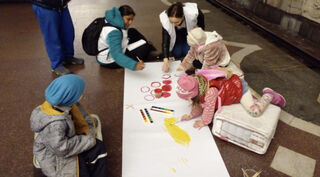Sleep
A Psychotherapist's Novel Way of Connecting With Clients
Journeying deep below the surface to practice psychotherapy.
Posted June 4, 2022 Reviewed by Vanessa Lancaster
Key points
- A Doctors Without Borders therapist serving in combat zones of Ukraine needed to figure out how to connect with traumatized Ukrainians.
- Wearing body armor and a helmet, avoiding rockets and shells, she traveled from one underground station to the next.
- Spending the night in a Kharkiv metro, enduring the same hardships as her clients, earned the therapist the acceptance she needed to do her job.
The Outsider
Imagine you are the ultimate outsider: a dark-skinned woman of Indian descent operating in a virtually all-white society, a South African psychologist serving an organization of French medical doctors, a person born and raised during Apartheid South Africa–a country in which skin pigmentation is amplified-and a practitioner of talking therapy in a country that you’ve been told both stigmatizes mental health problems and primarily treats them with pills.
Oh, and you don’t speak the language of the people you are trying to help either.

Those were the challenges facing clinical psychologist Devash Naidoo as she began her six-week mission for Doctors Without Borders to assess and address the emotional needs of Ukrainians under direct Russian attack in Kharkiv, Sumy, and other combat hotspots in Ukraine.
Wearing body armor and a helmet, moving about war-ravaged cities only during “green” times when artillery and rocket attacks were at a minimum, scurrying from one metro station to another, Devash’s challenge—in addition to staying alive— was formidable: how to quickly connect with traumatized Ukrainians who were culturally, racially and linguistically so different from her?
Pondering the problem, Devash decided to literally get down to her “clients’” level, spending time, including a sleepover, in the bowels of the Kharkiv metro as artillery shells rained down above.
She later told Chris Gilbert (also a Psychology Today contributor) and me over Zoom, “When I got down there with my interpreter, I could see frightened looks on their faces added to perplexed and curiosity at times ‘What was someone who looked like that [brown skin] doing down here?’”
Undeterred, Devash moved through the perpetually lit, cold, underground refuge, getting used to the odor of detergent emanating from latrines, reaching out to Babushkas, young girls, and children. “There was a bustle of the underground,” Devash said, “akin to an old city market. Laughter of children, food being distributed with an orderly and respectful manner, attendance of medical appointments with patience and gratitude for support provided.”
Ultimate Acceptance
Devash’s apprehensions about being accepted quickly vanished as she engaged with the underground dwellers, listening to their stories, anxieties, longing for absent family members, and shared confidence in ultimate Ukrainian victory.

“People were not as averse to mental health as I had expected and wanted to have a conversation and to share," Devash explained. “The adults, mostly Babushkas and young mothers, were not afraid of expressing fear, so I found that I could start with psychology right away.”
For some Ukrainians she met, starting with “psychology” simply meant accepting offers of fruit or invitations to explore their worlds while simply listening, as with one generous Babushka who gave Devash some berries, followed by a lengthy discussion on history, nostalgia, and hope. Just discussing what was happening and expressing emotions was therapeutic.
But others, such as young children, needed to learn to deal with fear, so Devash encouraged them to express those apprehensions while teaching them breathing exercises to practice during the loud booms and ground tremors of frequent bombardments.
As evening in the underground wore on, Devash met a dynamic teenage girl who expressed her frustrations about acquiring feminine sanitary products and her longing for her younger siblings who had gotten safely out of the country. Like many below ground, the girl was suffering from prolonged isolation from her loved ones.
But the teenager had also made new friends, introducing Devash to one of them, a security guard who pledged to keep Devash safe. The girl lit up a cigarette, and the three of them talked about the value of New Zealand currency (where Devash now lives when she is not on missions to Iraq and other trouble zones). “Just having a “normal” conversation about a mundane topic was therapeutic for both the girl and the guard.” Devash later told us.
When the sleeping period approached (with lights burning 24/7, there was no “night”), the environment grew subdued and, except for the meowing of cats and low murmuring of voices between bombings, quiet. Some tried to sleep, while others, unable to ignore the occasional explosions above them and show the effects of weeks of constant stress and lack of sunlight and fresh air, sat quietly, staring numbly ahead, waiting for the bombing to stop.
“The concrete floor I slept upon was cold and hard, and the booms and shaking earth not conducive to REM sleep, but I rested the best I could,” Devash recalled.
The sleep period over, Devash readied herself to return to the surface, where she planned to visit other metro stations. Noticing Devash’s preparations, the teenage girl she’d spent time with the night before, who didn’t look as if she’d slept much, ran up, threw her arms around Devash, held on tightly, and cried.
“It was such a touching moment,“ Devash explained, “A moment in which presence was fundamentally and deeply appreciated.”
As a former psychotherapist, I was moved, remembering that I lived for such rare moments, knowing that, at least for one person, I had made a difference.
But I think Devash got something more than that out of her journey into the depths of Ukraine.
She had completed the ultimate journey of an outsider into the embrace of fellow souls.




